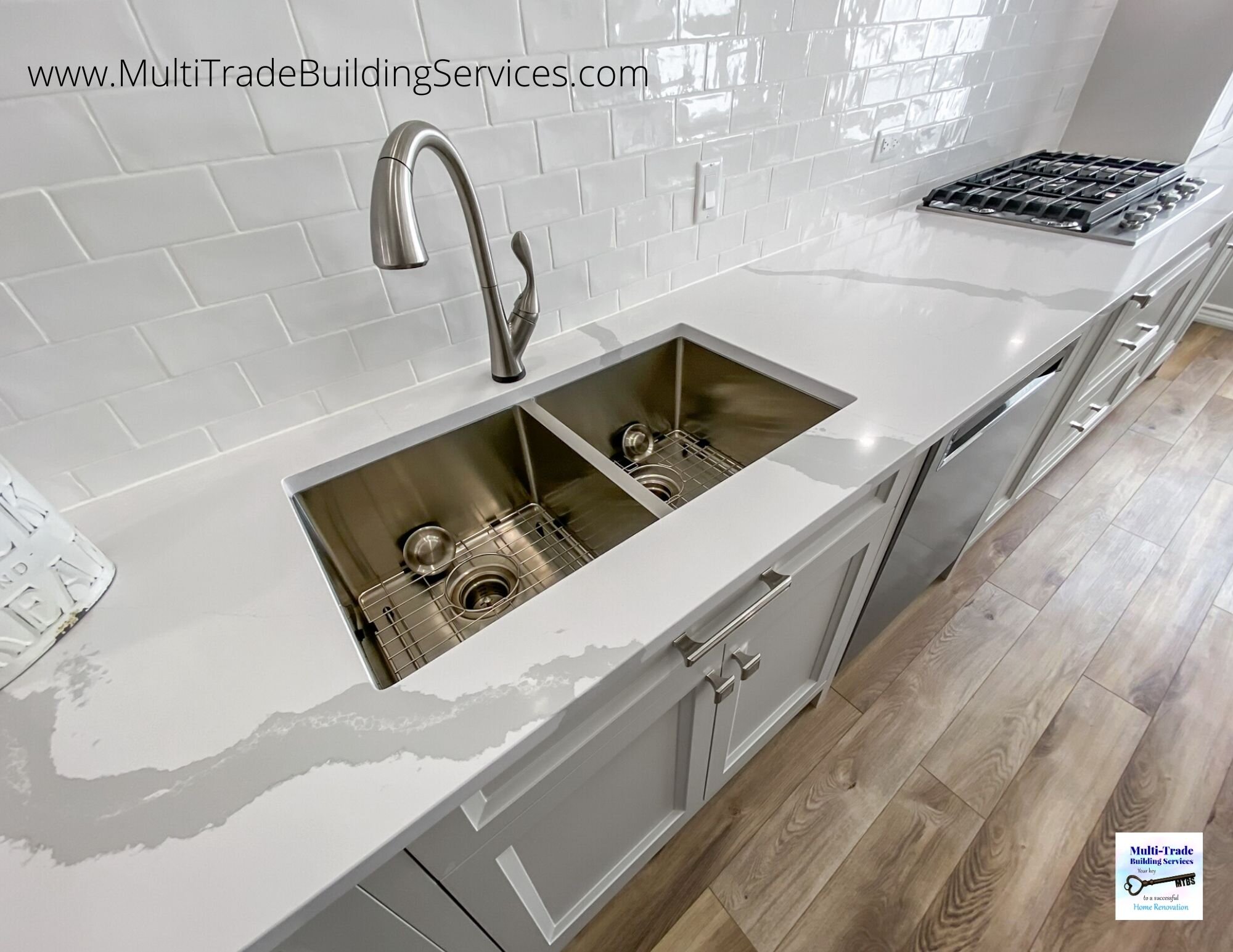How to Care For Your Quartz Countertop
/Whether you've already got a quartz countertop or you’re considering installing one, you need to know how to properly care for it. Quartz countertops are low-maintenance and easy to care for, but you need to know the details of how to do so in order to maintain their beauty and longevity. We’ll tell you all the steps and tricks you need to know to ensure you keep your quartz looking gorgeous for years to come.
Prefer to listen?
So What Is Quartz?
Quartz countertops are an engineered stone that is made with 80%–95% pure quartz mixed with a combination of polymers, resins, and pigments. The better-quality quartz countertops are the ones made with 92%–95% pure quartz. The best brands are Silestone, Caesarstone, Vicostone, Hanstone, Viatera and Dekton.
Think of making meatloaf. The more fillers, like breadcrumbs, that you add in, the lower the quality of the meatloaf. The best meatloaf is almost all ground meat. The same holds true with quartz countertops.
Basic Care
The first thing you need to know is that you should always get a proper care guide from the manufacturer of the quartz. If you've just had a new quartz countertop installed, the fabricator should be able to provide you with this. If not, contact your contractor to see if he has a care guide. Alternatively, you can also go online, as most quartz manufacturers have their care guides on their websites.
For the most part, caring for quartz is the same across all manufacturers. However, some manufacturers have specific guidelines that you need to follow in order not to void their warranty. Make sure you read their guidelines in addition to the steps we are outlining in this post.
If you don't know the brand name of your quartz because you weren't the one to install it, the guidelines below will give you the steps you need to take to care for it.
General Cleaning
Use a warm, wet cloth to wipe down the quartz. Do this as often as necessary, whenever you are cooking or cleaning. If you prefer, you can add a gentle dishwashing soap to some warm water to do the cleaning. Never use hot water. Adding a gentle soap would be particularly important if you've had any items on the counter that could contaminate, such as raw meat.
Dried on Pieces
If you have any dried-on pieces on the countertop, use a putty knife to gently scrape them up. Using the warm, wet cloth should have softened them up slightly to make this process easier. In my own kitchen, I keep a plastic putty knife that you can buy in any paint store. This is very gentle on the countertop and won't scratch the surface. Don't use a metal putty knife, as it could damage the countertop.
An even more important piece of advice is to try to prevent dried-up pieces from ever forming on the countertop. If you wipe your countertop often with a damp cloth, you can prevent things like this from happening.
Personally, I really like the Norwex cleaning cloths, as they never require soap. They contain antimicrobial properties, and all you need is some warm water to wipe down your countertop. It's the only cloth I use to do any cleaning at all.
Grease
If you have a buildup of grease on your quartz countertop, you can use a degreasing agent, but make sure it's safe for quartz countertops. Generally, you need to avoid disinfectants or degreasers that contain bleach. Bleach can damage your countertop.
If you are going to use a specific degreaser or disinfectant, I always recommend you rinse your countertop with clean water after you have used that particular spray. Just take a damp cloth and wipe down the countertop. Follow it up with a dry cloth so that you don't leave any water residue on the countertop.
Preventing Damage to Your Countertop
The best way to care for your quartz countertop is to prevent damage in the first place. Here are a few tips that you can follow to ensure your countertop stays beautiful:
Wipe up spills as soon as they occur. Although quartz is very low-maintenance and is the most forgiving of any countertop material, if spills are left for too long, permanent stains will occur. As soon as the spill occurs, wipe it up with a warm, wet, soapy cloth. Wine, tea, or coffee can leave permanent stains quicker than other substances, so be sure to wipe those up as soon as possible.
Protect your countertop from heat sources. Although quartz can resist very high temperatures, you should not put any hot pots on a quartz countertop. Thermal shock can occur. Thermal shock is a quick change in temperature, which is what occurs when a hot pot goes on a cool surface like a quartz countertop. Although a rare occurrence, a crack through your countertop can occur from thermal shock. Instead, put down a trivet or a towel, and then put your hot pot on top of that.
Don't leave cold drinks on your countertop for long periods of time. Cold drinks can condensate which can leave a water ring on your countertop. Although more forgiving than granite, if left for too long, this water ring can stain a quartz countertop.
Use a proper cutting board. This is one of the biggest mistakes I see clients make all the time. Because the countertop is natural stone, they think they can cut on it. Although quartz is hard, durable, and scratch-resistant, it is not scratch-proof. Using a knife directly on a quartz countertop can leave marks. And if you even needed another reason to use a cutting board instead of your quartz countertop as a cutting surface, cutting directly on quartz will dull your knives.
Stay away from harsh cleaners. Extremely acidic or alkaline cleaners can harm your countertop.
Do not use abrasive cleaning pads. The type of cleaning pads that you would use to clean your pots and pans will cause tiny scratches on the surface of your countertop. Although these might not be noticeable, they will cause your countertop to lose its lustre and shine over time.
Avoid anything with citric acid or citrus of any kind in it. If you've made some homemade lemonade and spilled some on the counter, make sure you wipe it up right away. Citric acid can weaken the seal on your countertop, leaving it vulnerable to discoloration. Before you use any type of cleaner on your countertop, make sure you check the ingredients to see if it contains citric acid.
Long-Term Maintenance
Although daily cleaning and regular wiping of your countertop are usually sufficient, doing a deeper clean at least once a month is recommended. To do so, spray a generous amount of non-abrasive cleaner and let it sit for 10 minutes. Wipe it down and rinse with warm or room-temperature water. If necessary, follow up with a dry cloth. Do not leave your countertop damp.
Outdoor kitchens are also becoming more popular, but quartz countertops are not recommended for the great outdoors. In general, manufacturers will not warranty quartz countertops that are installed in outdoor kitchens. Constant direct sunlight can fade the colours and lead to warping and even cracks.
In summary…
Quartz countertops are extremely durable, have hard surfaces, are versatile, and are easy to maintain. They are being used everywhere, including kitchens, bathrooms, and laundry rooms. There are so many styles and designs to choose from that you're sure to find something you love. Maintaining them can also be very easy if you follow the steps we've outlined above.
If you're thinking about installing a quartz countertop in your Durham Region home, give us a call. We only deal with the top six manufacturers, which guarantees you a quality product that will last a lifetime. Our experts can meet with you to take a measurement, provide you with a quote, and arrange for a professional installation every time. We look forward to helping you select your dream quartz countertop!
























